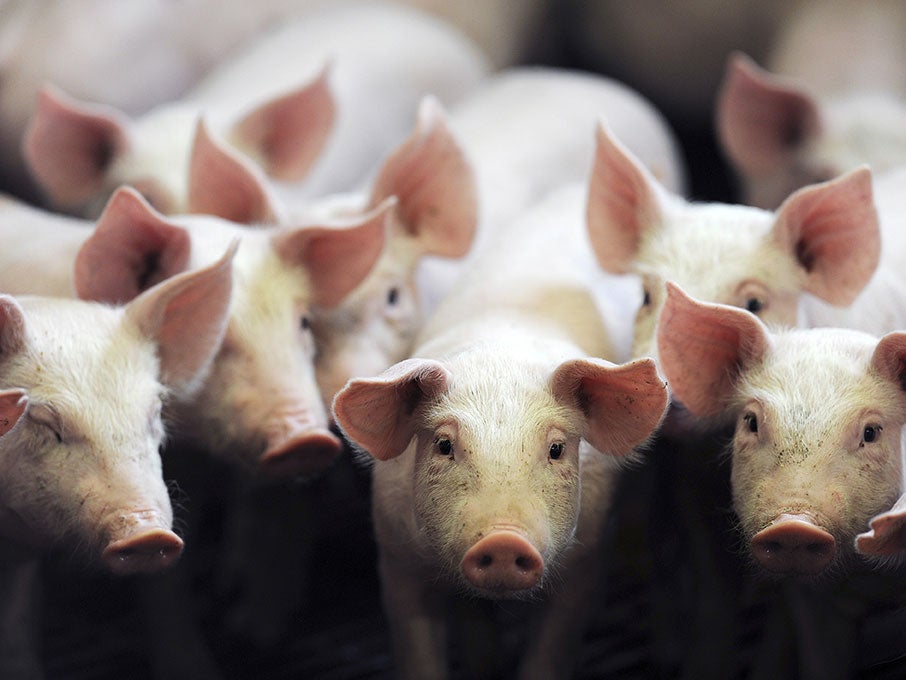Overuse of antibiotics in pig factory farming causing antibiotic resistant superbugs in humans, campaigners warn
Research suggests pig factories may heavily use antibiotics on pigs as they often feature overcrowding which can lead to animals biting each other and subsequently spreading infection through their wounds. Many animals also have poor immune systems as they are taken from their mother while still suckling

Your support helps us to tell the story
From reproductive rights to climate change to Big Tech, The Independent is on the ground when the story is developing. Whether it's investigating the financials of Elon Musk's pro-Trump PAC or producing our latest documentary, 'The A Word', which shines a light on the American women fighting for reproductive rights, we know how important it is to parse out the facts from the messaging.
At such a critical moment in US history, we need reporters on the ground. Your donation allows us to keep sending journalists to speak to both sides of the story.
The Independent is trusted by Americans across the entire political spectrum. And unlike many other quality news outlets, we choose not to lock Americans out of our reporting and analysis with paywalls. We believe quality journalism should be available to everyone, paid for by those who can afford it.
Your support makes all the difference.Excessive use of antibiotics in pork is leading to the growth of ‘superbugs’ in humans which are resistant to antibiotics, a campaign for ethical pig farming has warned.
45 per cent of all antibiotics in the UK are used in animals, with many being used in pig factory farming as poor conditions and high infection rates mean the medication is the only way to keep the animals alive. The World Health Organisation has warned that antibiotic use in pigs can spread to humans through consumption of pork and impact on human immune systems.
The campaign, Farms Not Factories, has been launched with the backing of high-profile figures including Jon Snow, Dominic West, Rupert Everett, Vivienne Westwood and Jeremy Irons. The celebrities feature in a video launched for the campaign in which they are seen responding to footage of pig factory farming conditions, with many visibly distressed and driven to tears.
A spokesperson for the campaign said: “These factories are cramming pigs into such horrendous conditions that they need to be routinely dosed with antibiotics just to keep them alive, leading to ‘superbugs’- human diseases that are difficult to treat because they have become resistant to antibiotics.”
These factories are cramming pigs into such horrendous conditions that they need to be routinely dosed with antibiotics just to keep them alive
Farms Not Factories founder Tracy Worcester said: “Our message is simple, we want to help bring an end to this dangerous, inhumane system and encourage the public to only buy pork from high welfare farms.”
Research suggests pig factories often feature poor conditions including overcrowding which can lead to animals biting each other and subsequently spreading infection through their wounds. Many animals also have poor immune systems as they are taken from their mother while still suckling, meaning they do not receive adequate nutrition in their early lives to develop strength and disease resistance.
Recently, ‘superbugs’ have emerged due to the increased prevalence of antibiotics in treating bacteria related conditions, including MRSA and C.diff.
In December 2015, a government review on anti-microbial resistance identified extensive use of antibiotics in intensive livestock production, such as pig factory farms, as a major cause of the increase in antibiotic-resistant diseases in the UK. It is believed that this may also be due to patients being over prescribed the medication, particularly for routine illnesses or infections which could be treated otherwise.
In March of this year, the EU voted to support draft plans to restrict drug use in livestock farming, however this has not yet passed into statute.
G7 leaders are due to discuss antibiotic resistance when meeting in Japan for a summit later this month.
Subscribe to Independent Premium to bookmark this article
Want to bookmark your favourite articles and stories to read or reference later? Start your Independent Premium subscription today.
Join our commenting forum
Join thought-provoking conversations, follow other Independent readers and see their replies
Comments